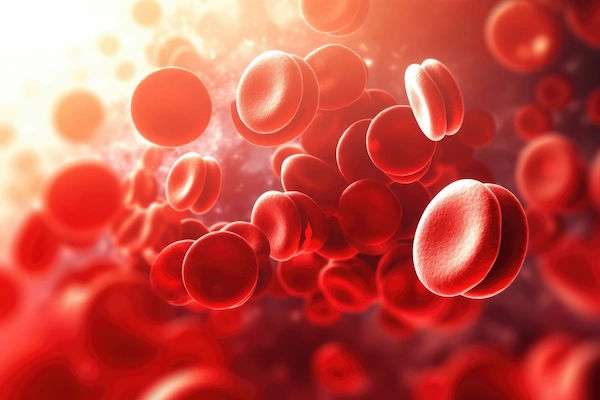Blood Clots: Causes, Types And Treatment Of Blood Clots
Learn about blood clots, their causes, symptoms, risk factors, and treatment options. Understand how to prevent complications and manage clot-related health issues effectively.

Written by Dr.Sonia Bhatt
Last updated on 13th Jan, 2026

Introduction
A blood clot is a semi-solid mass of blood cells and other substances that forms in your blood vessels. Blood clots help protect you from excessive bleeding if you are injured or undergo surgery. However, blood clots can also develop for other reasons, such as underlying medical conditions. When this occurs, blood clots can cause symptoms and may be life-threatening. In this article, we will explore the causes, symptoms, and treatment options for blood clots.
Causes of Blood Clots
Blood clots form when substances in the blood thicken and create a semi-solid mass. This process is often triggered by an injury, but it can sometimes occur in blood vessels without any obvious injury.
Once these clots form, they can travel to other parts of the body, potentially causing harm. A variety of factors and conditions can lead to problematic blood clots, and several serious conditions are associated with them. These include:
Antiphospholipid syndrome: An autoimmune disorder that increases the risk of blood clots by affecting the blood's clotting ability.
Arteriosclerosis / atherosclerosis: A condition where the arteries become hardened or narrowed, increasing the risk of clot formation.
Cancer: Some cancers and cancer treatments can increase clotting risks due to changes in the blood.
Certain medications: Drugs like oral contraceptives and hormone therapy can raise the risk of blood clots.
Deep vein thrombosis (DVT): A condition where blood clots form in deep veins, often in the legs, and can travel to the lungs.
Factor V Leiden: A genetic mutation that increases the likelihood of developing abnormal blood clots.
Family history of blood clots: A family history of blood clotting disorders can increase your own risk of developing blood clots.
Heart arrhythmia: Irregular heartbeats can cause blood to pool in the heart, increasing clot formation.
Heart attack: Clots can form in the heart's blood vessels, leading to a heart attack or stroke.
Heart failure: Inadequate blood flow in heart failure can lead to clot formation in the heart.
Obesity: Excess weight can contribute to poor circulation and increase the risk of clots.
Peripheral artery disease (PAD): Narrowed arteries in the limbs increase the risk of clot formation.
Polycythemia vera: A rare blood cancer that causes the body to produce too many red blood cells, increasing clotting risk.
Pregnancy: Hormonal changes and increased pressure on veins can raise the risk of developing blood clots.
Prolonged sitting or bed rest: Extended immobility can cause blood to pool and form clots, especially in the legs.
Pulmonary embolism: A blockage in the lungs caused by a clot that travels from other parts of the body.
Smoking: Smoking damages blood vessels and increases the likelihood of clot formation.
Stroke: Blood clots can form in the brain’s blood vessels, leading to a stroke.
Surgery: After surgery, particularly long procedures, there is an increased risk of clot formation due to prolonged immobility and injury to blood vessels.
Types of Blood Clots
There are three types of blood clots:
Venous thromboembolism occurs in your veins, most commonly in the legs.
Pulmonary embolism happens when a blood clot travels to your lungs and blocks an artery.
Coronary thrombosis occurs when a blood clot blocks an artery in your heart, potentially causing a heart attack.
Risk Factors for Blood Clot Formation
Several factors can increase the risk of developing blood clots, including:
Age: Individuals aged 65 and over have a higher risk of blood clots.
Pregnancy: Pregnancy increases the likelihood of blood clots.
Obesity: Being overweight or obese raises the risk of clot formation.
Cancer: Certain types of cancer can increase blood clot risk.
Hormonal treatments: Taking birth control pills or undergoing hormone therapy can elevate the risk.
Smoking: Smoking is a significant risk factor for blood clots.
Immobility: Prolonged periods of inactivity, such as being unable to move around, can contribute to blood clot formation.
Diagnosis of Blood Clots
The diagnostic tests and procedures that help in the diagnosis of blood clot includes:
Ultrasound: This is commonly used to detect blood clots, particularly in the legs (deep vein thrombosis, DVT). High-frequency sound waves create images of blood flow and can identify clots in the veins.
CT Scan (Computed Tomography): This imaging test is used to diagnose pulmonary embolism (PE), where a clot has travelled to the lungs. It provides detailed images of the chest to detect clots in the lungs.
MRI (Magnetic Resonance Imaging): An MRI can be used to identify clots, particularly in the brain (in cases of stroke) or other parts of the body.
D-dimer Test: A blood test that measures the presence of fibrin degradation products, which are released when blood clots break down. Elevated levels can indicate the presence of a clot.
Venography: A contrast dye is injected into a vein to highlight blood flow, used less frequently due to the availability of non-invasive tests.
Treatment Options for Blood Clots
Treatment for blood clots varies based on the location of the clot and your overall health. If you are experiencing symptoms and suspect you may have a blood clot, it is crucial to seek medical attention immediately.
Recent advancements in research have greatly improved the prevention and treatment of blood clots. Some of the current treatment options include:
Anticoagulants: Medications that help prevent further clot formation by thinning the blood.
Thrombolytics: Medications that work to dissolve existing blood clots.
Catheter-directed thrombolysis: A procedure where a catheter is inserted into the body and directed towards the clot. It delivers clot-dissolving medication directly to the clot site.
Thrombectomy: A surgical procedure to remove a blood clot from the body.
Prevention of Blood Clots
Preventing blood clots is important, particularly if you are at a higher risk due to medical conditions or lifestyle factors. Some strategies to reduce the risk of developing blood clots include:
Regular exercise: Staying active helps maintain healthy blood circulation, reducing the risk of clot formation.
Maintaining a healthy weight: Obesity is a significant risk factor for blood clots, so managing weight can help reduce the risk.
Avoiding long periods of immobility: If you are travelling for long distances or recovering from surgery, make an effort to move or stretch regularly.
Wearing compression stockings: For individuals at risk of deep vein thrombosis (DVT), compression stockings can help improve circulation and reduce clot risk.
Taking prescribed medications: If you are at risk, your doctor may prescribe anticoagulants to prevent clots from forming.
Smoking cessation: Quitting smoking can significantly reduce your risk of developing blood clots.
Staying hydrated: Drinking plenty of fluids helps maintain good circulation and prevents blood from becoming too thick.
Managing underlying conditions: If you have conditions like high blood pressure, diabetes, or high cholesterol, it’s important to keep them under control to lower your risk.
Conclusion
Blood clots can be life-threatening if untreated, but understanding their causes, symptoms, and treatment options is key to managing and preventing them. Factors like age, obesity, pregnancy, and certain medical conditions increase the risk of blood clots. Adopting a healthy lifestyle, staying active, and managing underlying conditions can significantly reduce this risk. If you suspect a blood clot, seek medical attention immediately. Early diagnosis and proper treatment can effectively manage the risks and help maintain your health.
Consult Top General Physicians
Consult Top General Physicians

Dr. Dhanraj K
General Physician/ Internal Medicine Specialist
25 Years • MBBS, MD Internal Medicine - Osmania Medical College, Hyderabad
Hyderabad
Apollo Hospitals Jubilee Hills, Hyderabad
(425+ Patients)

Dr. Vivek D
General Physician
4 Years • MBBS
Bengaluru
PRESTIGE SHANTHINIKETAN - SOCIETY CLINIC, Bengaluru

Dr Syed Mateen Pasha
General Physician
2 Years • MBBS
Bengaluru
PRESTIGE SHANTHINIKETAN - SOCIETY CLINIC, Bengaluru

Dr. Syed Ismail Ali
General Practitioner
7 Years • MBBS
Hyderabad
Apollo 24|7 Clinic, Hyderabad

Dr. Ajay K Sinha
General Physician/ Internal Medicine Specialist
30 Years • MD, Internal Medicine
Delhi
Apollo Hospitals Indraprastha, Delhi
(225+ Patients)




